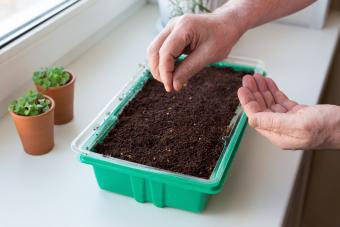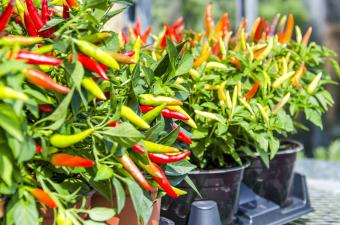
If you miss vegetable gardening during the winter months and want to get a jump on your spring planting, start some vegetable seeds indoors. Doing so isn't a requirement, but many gardeners do it to get a head start so they can harvest fresh, flavorful veggies as early as possible. When you start seeds indoors before you can safely do so outdoors, chances are that you'll have strong, healthy seedlings ready to plant as soon as outdoor conditions are right.
Wondering when to start vegetable seeds indoors? There's no one-size-fits-all answer. Not all plants germinate or grow at the same rate or in the same conditions. Some seeds do better when sown directly into the ground rather than being started inside and transplanted. Fortunately, with some basic information about your climate and the seeds you want to plant, you can easily decide when to start vegetable seeds indoors during the winter.
First Know Your Frost Dates
Before you can calculate when to start seeds indoors for the vegetables you want to grow, you'll need to know your area's last frost date. Go to The Old Farmer's Almanac and enter your zip code to get this information.
This date is a general guideline, but it may not be exact. It's when the last frost - which is a light freeze - is anticipated. However, the weather doesn't always do what's expected. It's not unusual for one (or even more) frosts to occur after this date.
When to Plant Warm-Season Vegetable Seeds Indoors
Once you know your last frost date, you can make plans to start your warm-season vegetables indoors. The table below includes warm-season crops that are good candidates for indoor seed starting, along with a general recommendation for the number of weeks before last frost date to start them.
| Seed | |
| 8-10 Weeks Before Last Frost Date | |
| Celery | Peppers |
| 6-8 Weeks Before Last Frost Date | |
| Eggplant Tomato | Tomatillo |
| 5 to 6 Weeks Before Last Frost Date | |
| Cucumbers | |
| 4 to 6 Weeks Before Last Frost Date | |
| Yellow squash Winter squash | Okra Zucchini |
| 2 to 4 Weeks Before Last Frost Date | |
| Melons | Pumpkins |
How to Calculate When to Start Seeds Indoors
The best way to calculate when to start your seeds is to pull your last frost date, then use a calendar to count back the number of weeks appropriate for the seeds you're looking to plant. That will give you the ideal date range to plant each seed. For example:
- Where I live, my last spring frost date for 2023 is April 12. (The date may vary by a few days each year.)
- I want to grow peppers and celery, which I can start indoors 8-10 weeks before the last frost.
- I need to find April 12 on the calendar, then count backwards to find the dates that correspond with 8-10 weeks before April 12.
- When I count back 8-10 weeks from April 12, that reveals that I should start my pepper and celery seeds indoors between February 1 and 15.
Warm-Season Veggies You Should Never Start Indoors
Some warm season vegetables should be direct-sowed outdoors rather than being started indoors. For the vegetables listed below, plan to sow them directly into your garden after last frost.
- Beans - Beans germinate so fast that it's best to start them outdoors when it warms up.
- Beets - Beets generally don't transplant well, so it's best to direct sow them.
- Carrots - Carrots will not grow after being transplanted.
- Cowpeas - Like beans, these legumes sprout so fast it's best to direct-sow them when it's warm.
- Corn - Corn does much better when it's direct-sowed rather than transplanted.
Get a Head Start on Your Summer Garden
Starting warm-season crops indoors is a wonderful way to get a head start on your summer garden. Consider your indoor seedlings your first round of summer garden prep. Once last frost has passed and the temperatures are warm enough to put your first batch of seedlings in the ground, then it'll be time to direct sow things like corn and beans, as well as to start another round of seedings. By then, you'll be able to start new seedlings outdoors - either in containers or in the ground.







